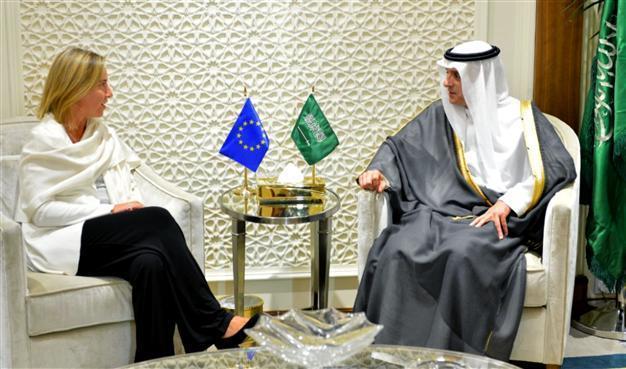Saudi FM slams 'aggressive' Iran comments
RIYADH - Agence France-Presse

This handoutphoto taken and released by the Saudi Press Agency (SPA) on July 27, 2015 shows Saudi Foreign Minister Adel al-Jubeir (R) meeting with EU foreign affairs chief Federica Mogherini in Riyadh. AFP photo
Saudi Arabia's foreign minister on July 27 denounced "aggressive statements" by Iran, intensifying the verbal sparring between the regional rivals following a global deal on Tehran's nuclear programme.
The remarks were the latest in a back-and-forth that has raised tensions as senior Western officials visit Iran and Sunni-majority Gulf countries in the wake of the landmark accord between global powers and the Islamic republic.
A day earlier, Iran's foreign ministry spokeswoman accused Saudi ally Bahrain of making "unfounded allegations" to foment "tension in the region", after Bahrain's interior ministry announced the detention of two men accused of trying to smuggle weapons from Iran.
"This does not represent the intentions of a country seeking good relations," Saudi Foreign Minister Adel al-Jubeir said of the Iranian comments.
"These statements are escalating and they are many," he complained.
On July 26, Iran's Foreign Minister Mohammad Javad Zarif declared in Kuwait that "some countries... want conflict and war in this region", apparently referring to Saudi Arabia.
He dismissed as "baseless" Bahrain's claims of Iranian weapon smuggling, calling the remark an attempt to prevent any progress in cooperation between Iran and other Gulf states.
Jubeir said he had brought up the "unacceptable" Iranian remarks during talks with visiting EU foreign policy chief Federica Mogherini, who briefed him on safeguards in the July 14 Vienna agreement that seeks to curb any Iranian attempt to get an atomic bomb.
Mogherini's visit was the latest in a string of visits to Riyadh by top Western officials seeking to soothe the kingdom's concerns over the Iran accord.
US Defense Secretary Ashton Carter visited Saudi Arabia to discuss the deal last week, and French Foreign Minister Laurent Fabius will travel to Tehran on Wednesday in what President Francois Hollande has described as a "test of Iran's behaviour".
"The agreement is strong and solid," Mogherini said at a joint press conference with Jubeir, ahead of a visit July 28 to Iran to start work on the implementation of the deal.
The European Union played a leading role in the nuclear talks between the so-called P5+1 -- Britain, China, France, Russia, the United States and Germany -- and Iran.
Mogherini has hailed the agreement, which required years of negotiations, as a "sign of hope for the entire world".
It requires Iran to curb its nuclear capabilities, including its number of uranium centrifuges.
International monitors will supervise the process, and in exchange an embargo that has crippled Iran's economy will be eased.
The deal also paves the way for Iran's oil exports to gradually resume and for the unblocking of billions of dollars in frozen assets.
Mogherini said the flow of funds "will take some time and it will be gradual, as the lifting of the sanctions will be gradual".
Riyadh and its Sunni-dominated neighbours accuse Shiite regional rival Iran of meddling in Bahrain, Iraq, Syria, Lebanon and Yemen.
They share with Israel a concern that Iran, made wealthier under the agreement, will be better able to support its regional proxies.
Some countries in the region also worry that Iran could still be able to develop an atomic weapon -- potentially sparking a regional arms race.
"We understand the concerns very well," Mogherini said. "Trust is not there yet."
But she said the agreement could open the way for a different future in the region, "passing from confrontation to cooperation".
Meanwhile, she and Jubeir voiced the need for a political solution in neighbouring Yemen, where a Saudi-led coalition has been carrying out air strikes against Iran-backed Shiite Huthi rebels for the past four months, in support of exiled President Abedrabbo Mansour Hadi.
The coalition unilaterally declared a five-day truce that began Monday, to allow the delivery of humanitarian aid to people trapped by the fighting.
But in a "friendly fire" incident on July 27, coalition warplanes hit the positions of pro-government forces, killing a dozen people in spite of the truce, military sources said.
